
The World Artificial Intelligence Conference ( WAIC) 2022 was held from September 1st to 3rd last week, and it has attracted over 600 million views worldwide.
This conference used to have industry icons such as Elon Musk, Jack Ma, Kai-Fu Lee, etc. talking about AI and our future. This year, over 200 companies exhibited and over 100 forums were held to discuss topics from cloud computing, big data, privacy computing, biomedical science and biomedicine, governance and ethics, and brain-machine interface.
This is the fifth year Shanghai has been holding WAIC, and those invited accumulatively over the years were 14 Turing Award winners, 6 Nobel Prize winners, and close to 300 academicians.
A series of deals have been reached during the conference, and the total investment has reached 15 billion yuan ( $2.18 billion ).
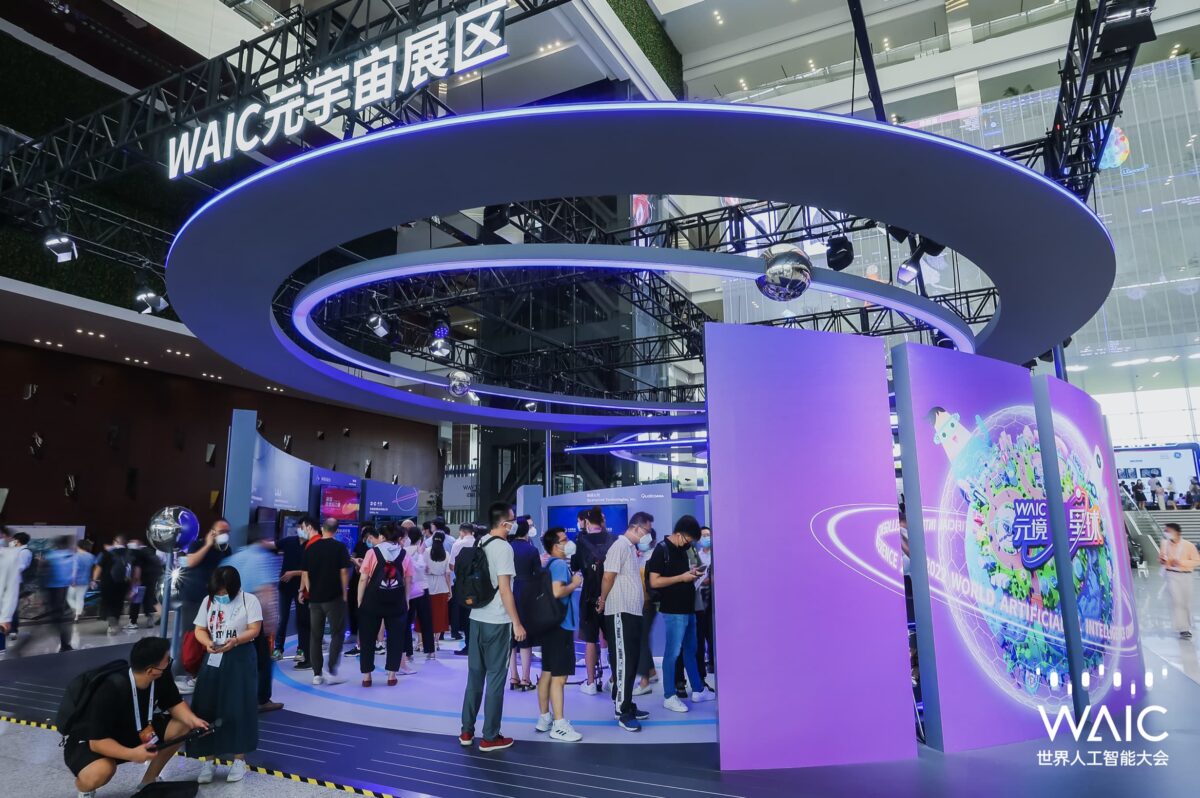
The theme of this conference is “Intelligent Connectivity. Infinite Multiverse”
This conference allows you to create avatars and connect with people online. You can feel that you are at the forefront of AI and Metaverse trends.

WAIC – A Conference with Global Engagement
WAIC’s main site is located at World Expo Center, with concurrent meetings in Zhangjiang and Xuhui districts. It also has overseas forums located in the Bay Area in Los Angeles, North Korea, Europe, etc.
2022 Metaverse Industry Map
During the opening ceremony on the first day, the China Academy of Information and Communications Technology released the 2022 Metaverse Industry Map, which classified some companies that fall into three categories of the Metaverse industry: Fundamental technology, Product & Service, and Industry Applications.

VP of Baidu Yuan said that the real Metaverse is the perfect combination of powerful AI with the virtual world. Without fundamental technologies, we can never build the dazzling upper-level architect of the Metaverse.
WAIC buzz words you need to know
Digital twin
According to IBM, a digital twin is a virtual copy that resembles the original object in the real world using real-time data, simulation, machine learning, and reasoning, just like twins that mirror each other.
AIGC
AIGC means Artificial Intelligence generated content. AIGC will soon disrupt how content is created. AI will help us create content faster at lower costs, boosting efficiency.
Trusted Data Exchange
A trusted data exchange implies that the exchanging parties have a system in place to generate trust in the integrity of the other party and their contribution to the exchange, hence reducing uncertainty and accelerating commerce.
Privacy Computing
With increasing concerns about data security, privacy, and confidentiality, we need new solutions to data collaboration. What if governments want to fight corruption and money laundering but cannot access the data because of privacy protection regulations? So it is necessary to have privacy computing to protect the privacy and facilitate data collaboration altogether.
According to Venturebeat, privacy computing technologies facilitate extracting value from data, without the need to compromise privacy.
AI and Smart Driving at WAIC
AI has been deeply integrated with the automotive industry for a long time. There are some cars exhibited at WAIC using AI technologies for smart driving. They demonstrated advancements in battery, autonomous parking, controllable car modules, precise network sensors on cars, etc.
At WAIC, a company called ZongMu demonstrated its autonomous valet parking (AVP) features, which combine algorithms, sensors, and computer vision. This technology has been integrated into 1 million cars already. It’s now installed in more than 1 million cars for brands such as BYD, Geely,HiPhi, Li Auto, Chang’an, SERES, etc.
Internet giant Baidu is making progress, too. Its self-driving taxi received 1 million orders in July from more than 10 cities all over China, including the city of Shanghai. Baidu’s PaddlePaddle AI platform now has 4.77 million developers serving 180,000 organizations, and it covers scenarios in various sectors such as finance, energy, industrial, and retail.
AI and the Service Industry at WAIC
Who doesn’t need a cup of coffee early morning for a whole day of the conference at WAIC?A robot can make coffees and do various jobs such as getting cups, dropping ice, grinding coffee beans, making coffee and frothing milk. This coffee robotic machine created by Hai Tun Technologies called COFE+ was on display during the show, servings all the participants.
Name whatever you need, Latte, Americano, Espresso, French Au Lait, Flat White, etc, it does the job. The only problem or the only frustrating moment occurred when it ran out of milk and a human assistant came forward to add some milk to it. Apart from that, everything is perfectly done by this machine.
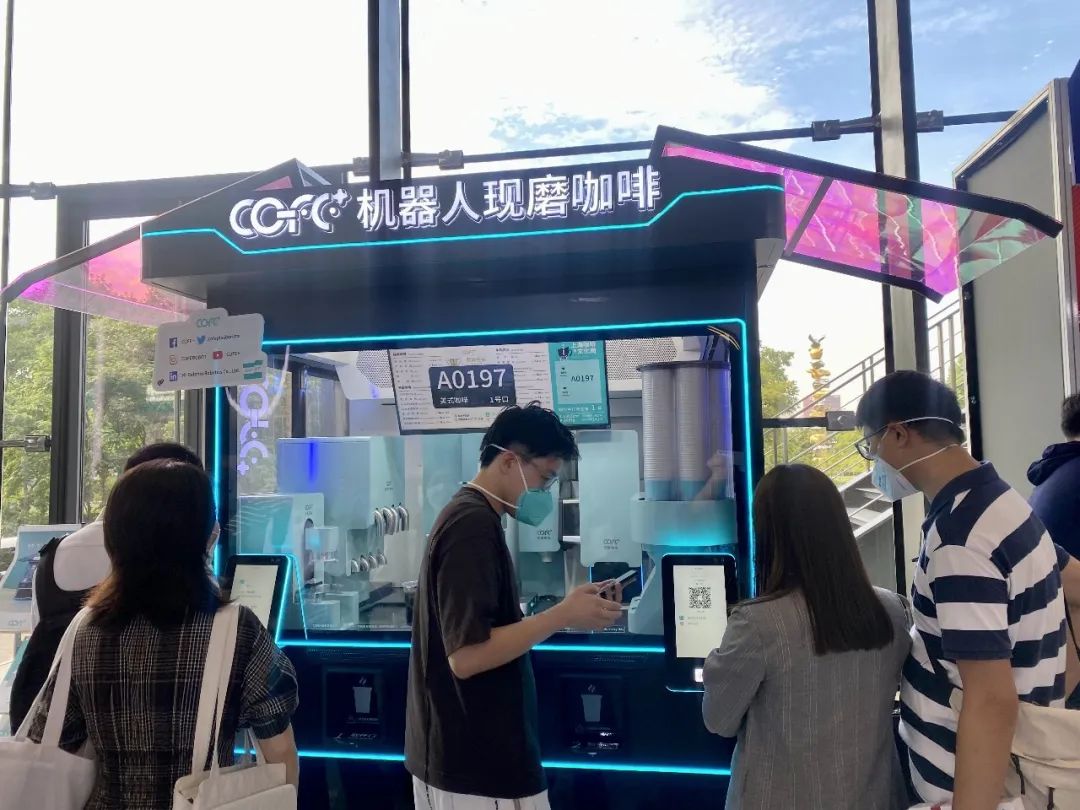
All you have to do is scan the code on the screen, pay, select the coffee you like, pay, and wait for 40 seconds. It is a good example of how AI will change our service industry.
AI and Logistics at WAIC
General Manager Bing Fu from Dada Group mentioned in his speech that AI can improve the efficiency of on-demand delivery to better serve customers. Dada used AI algorithm to locate where the customers are so that the delivery person can easily identify customers. This algorithm learns from the data gathered before such as which building the customer is located in history orders and the accuracy rate has reached 95.1% now. Its algorithm also calculates the time needed for delivery using AI and considers the safety of riders. Now they already collaborated with many supermarkets and brands such as JD.com.
Brain-Machine Interface and Neuroscience
At WAIC, Dr. Gerwin Schalk, the guest professor at Hua Shan Hospital and Fudan University, talked about how AI can be used in some of the most cutting-edge neuro technologies, both invasive and non-invasive. He said that brain-machine interface technologies can be used in treating Parkinsons’ disease and epilepsy. It can also be used to monitor sleep patterns to improve sleep and treat insomnia. But the difficulty in combining neuroscience and brain-machine engineering is the fact that the multi-disciplinary studies involved are just too complex and require multiple expertise and academic backgrounds.
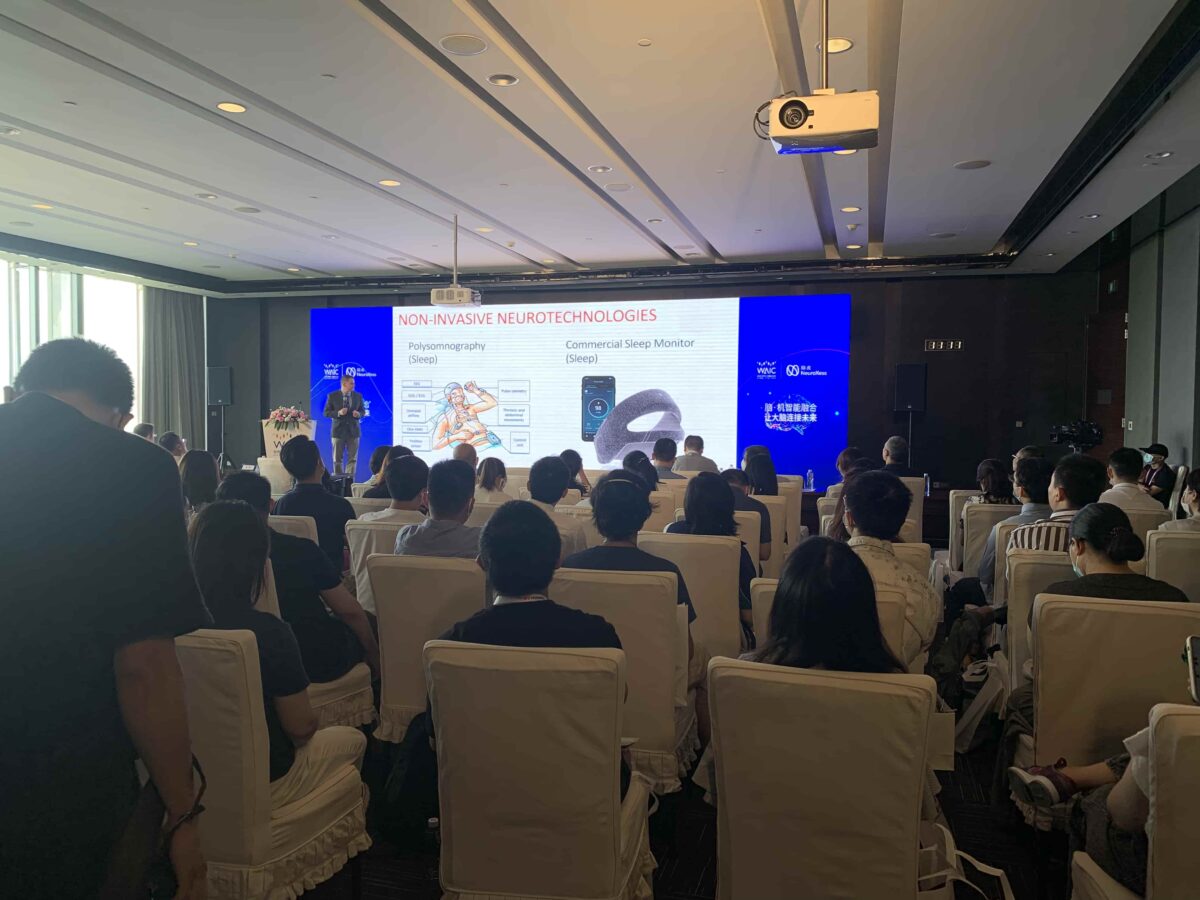
Dr. Gerwin Schalk delivered a speech at WAIC
AI Computing – the Bottleneck of AI Development
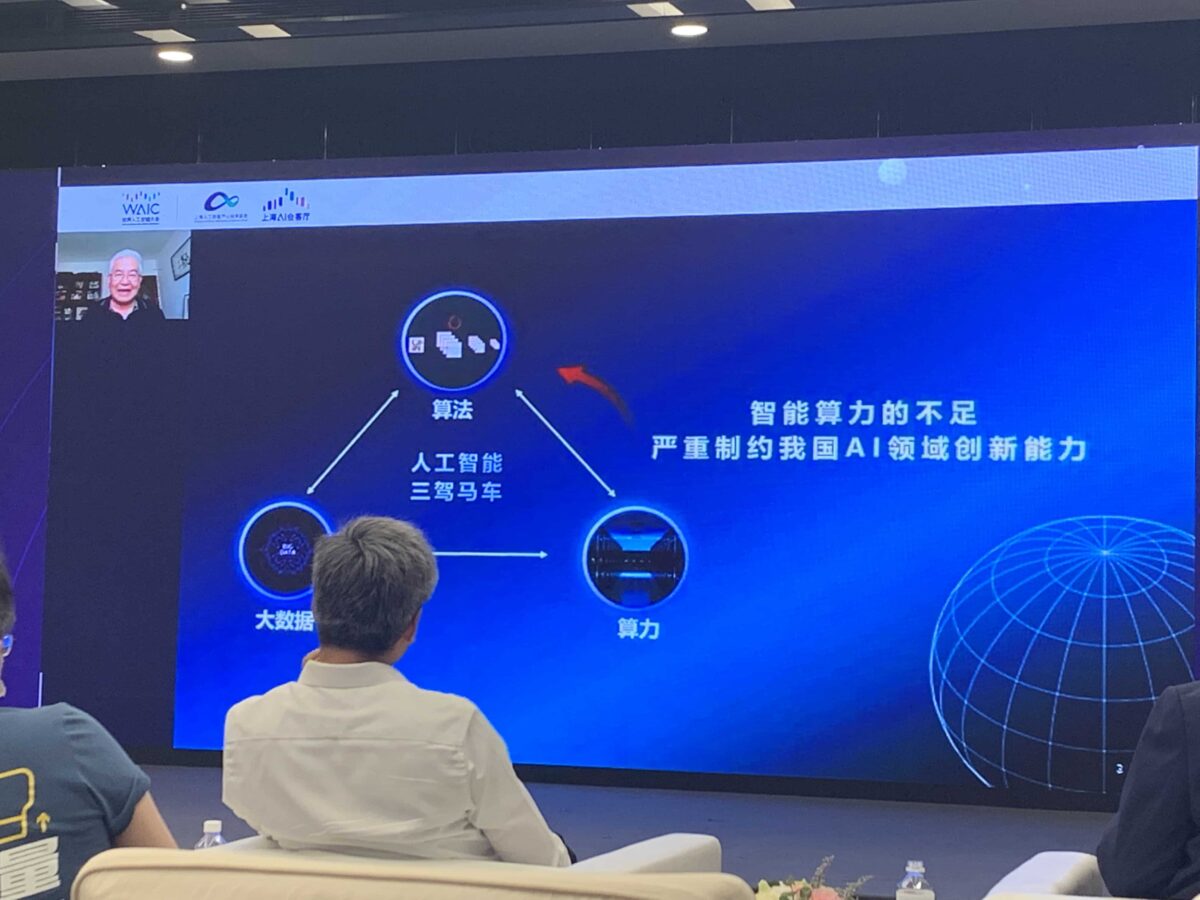
Experts have pointed out during WAIC that computing power is like oil and gas for the AI industry. Limited computing power will curb technological growth. It is estimated that for every dollar invested in computing power, there will be at least another output of $3-$4 in GDP. This is how closely computing power and the economy are related and it shows why improving computing power can boost the economy.
AI, Metaverse, Virtual Personas.
Virtual avatar host Xi Jiajia attended the WAIC opening ceremony, and over 10,000 people participated in the metaverse created by the WAIC organizing committee. Indeed, how can we not talk about metaverse and virtual personas when they are becoming so ubiquitous?
CEO of Unity in China Junbo Zhang proposed that we cannot view the metaverse as a concept of space but a concept of time, only when people spend more time in the virtual world than in the real world can we say that we have entered the metaverse era. Early this year, Unity bought Ziva Dynamics. Ziva team has experience in sophisticated simulation and deformation, machine learning, and real-time character creation. Ziva team has technology that can reduce weeks or even months of work on rendering virtual personas to just a few hours, making large-scale production of digital personas possible and less time-consuming.
Zhang considers the real metaverse is a 3D version of the Internet, and it has to be highly interactive, real-time 3D, highly social, and constantly stable. From that perspective, most of the metaverse products on the market are just not metaverse in a real sense such as pre-recorded virtual concerts, games, and others. They only display content as programmed but cannot react to the outside, so they are not acting in real-time and cannot interact with others.
AI in Shanghai
It is said by the mayor of Shanghai that Shanghai’s AI output has surpassed 300 billion yuan (US$43.5 billion) annually and one-third of AI talents in China are based in Shanghai.
It is no wonder that the Shanghai government has shown the greatest support for AI development. Since the first convening of the WAIC in Shanghai back in 2018, its government has launched major projects to support AI applications in various industries.
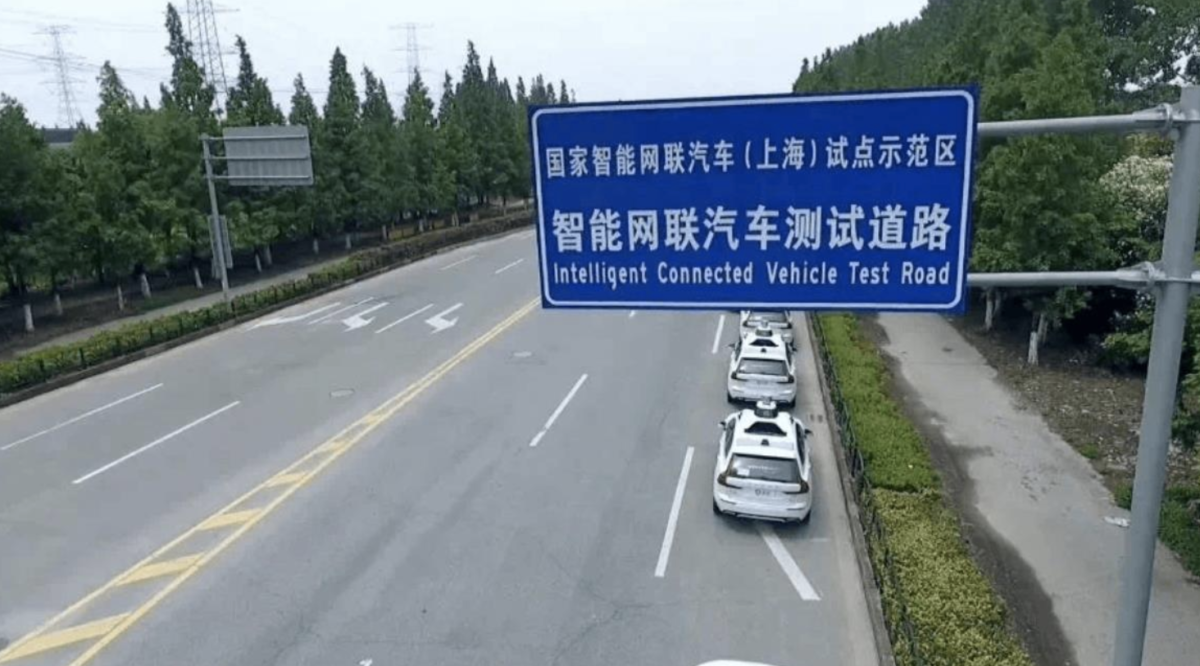
Shanghai has opened its first autopilot vehicle test road on Donghai Bridge in Pudong New District and added over 300 roads afterward dedicated to testing autopilot technologies.
In Shanghai First People’s Hospital, 5G networks are enabled to explore ER service with 5G and AI. Data are synced and connected with the hospital from the very moment the patient was taken into the ambulance, so saving time is saving lives. This is just a small part of the endeavor to build “smart hospitals”.
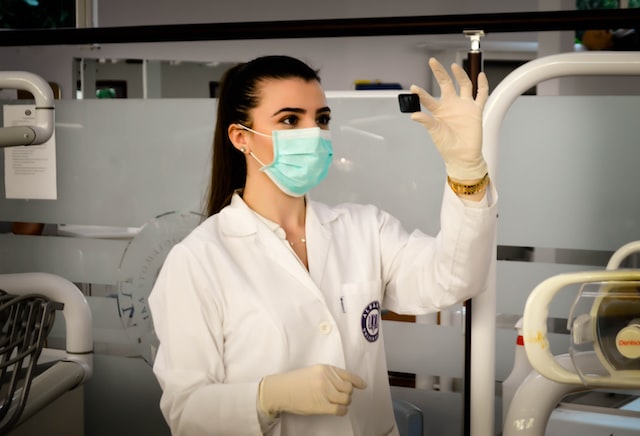
For entrepreneurs aiming at the AI and the metaverse industry, Shanghai is a city you cannot miss and we can predict that all the budding technologies will be materialized sooner than in any other place in the world.